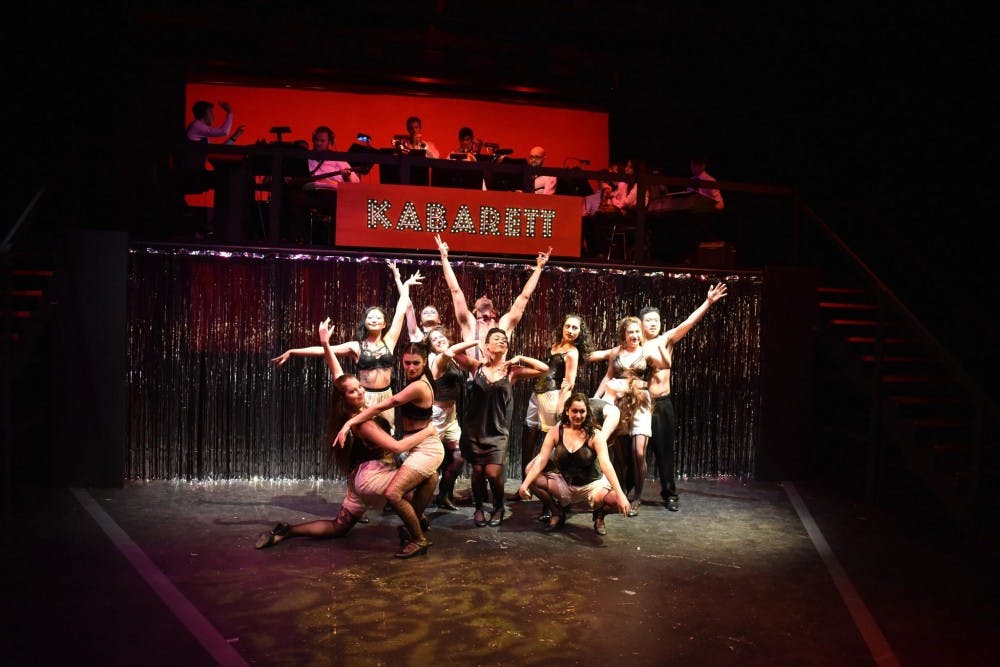
In this week’s issue of Art and Activism, I will be taking a break from my regularly-scheduled programming (i.e. socially-engaged film and fiction) to talk about socially-engaged theatre, specifically the Barnstormers spring musical production of Cabaret. First performed in 1966, Cabaret focuses on a cast of characters in a seedy nightclub in 1930s Berlin. The German political scene is rapidly changing as an American man named Clifford Bradshaw falls in love with one of the nightclub’s dancers, an English woman named Sally Bowles.
In order to not spoil the story for you, all I’ll say is that over the course of the show, their world is altered forever. While the musical starts out as a fun time, beginning with a very long song welcoming all of the audience members to the Kit Kat Club, and is filled with a bunch of wonderful and catchy songs, by the last number the show transforms, becoming much more sinister than even its own characters ever could have predicted.
I was lucky enough to be able to work on this production with the Barnstormers as the set designer and one of the technical directors in charge of building the set. The experience was really quite something. I have worked with this theatre group since I was a freshman, and this season’s shows surely did not shy away from challenging topics.
This past fall, the Barnstormers put on a production of The Laramie Project, which takes place in the small town of Laramie, Wyo. after the hateful murder of a gay young man named Matthew Shepard. When we started the production process for Cabaret back in February, a large part of our discussions as a team was about embracing how relevant the show is in the present day.
In Cabaret, the ideal life and imagined future that Cliff and Sally build together is threatened by the rise of the Nazi party. As one character in the show says, the Nazis are no longer just some distant idea; they are one’s friends, neighbors and acquaintances. Soon the question of “How to proceed?” arises. Should characters maintain their relationships even if they disagree with the political views that certain individuals are espousing? Should they distance themselves from those people given that the nature of what they’re disagreeing on is both so political and personal? Or, perhaps, should they go so far as to completely cut those people out of their lives?
As I’ve grown older and become more aware of national and international politics, I’ve thought about many of these questions often. After all this time, I still don’t have clear-cut answers.
My parents continue to stress to me the importance of respecting other people’s political views because they are so personal. Whether or not we wish to acknowledge it, the fact of the matter is it is difficult to separate our politics from our personal life experiences. And who am I to say that someone’s own experiences, and the subsequent feelings and emotions that stem from them, are somehow not valid?
At the same time I acknowledge that I am coming from a place of privilege in that I even have the option to be asking these questions. In the eyes of today’s society, I, as an Asian American woman, am not seen as a huge threat. Does it then follow that I am allowed to continue being friends with people who are racist, who are misogynistic, who are homophobic?
Like some of the characters in Cabaret, I am still struggling with this question. My gut response is to say that, although I am “allowed” to continue fostering these relationships, it is not something I want to do.
Why would I associate myself with someone who thinks that there are some people who just do not deserve basic human rights such as a living wage, a place to call home and the ability to feel safe. But I also know that I am not someone who finds confrontation comfortable and cutting people out of my life affirms the fact that I see some differences in opinion as irreconcilable.
While finding an acceptable balance between standing by my beliefs and respecting the opinions of others feels like throwing a bunch of questions up in the air and hoping to catch some answers, I am still determined to try.
At its heart, Cabaret is about people trying to figure their lives out as their world and everything they thought they knew about it are falling apart. I won’t say that my world is falling apart, but in a sense, there are a lot of things that I thought about the world that I’m just now realizing are not necessarily stable. The most important lesson I’ve learned so far is that while a lot of things may at first seem clear-cut, more and more shades of gray populate our world every day.





